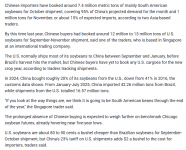“A tariff here means nothing.”
This is patently wrong. Unless of course you feel a hit to person’s livelihood means nothing. It is a demonstrable fact that soybeans in North Dakota are worth less at the farm due to China not buying.
Maybe you are not familiar with the concept of “basis” in the grain marketing world.
A very short article :
With Chinese purchases stalled and trade war tensions rising, North Dakota soybean basis values are dropping fast. Discover how U.S. farmers can navigate uncertain markets as harvest approaches and decisions loom.

www.codakgroup.com
Grampa once told me to stop digging.


